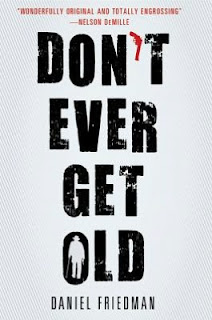 Daniel Friedman's writing has been published at McSweeney's, Yankee Pot Roast, Science Creative Quarterly and The Big Jewel.
Daniel Friedman's writing has been published at McSweeney's, Yankee Pot Roast, Science Creative Quarterly and The Big Jewel.His new book is Don't Ever Get Old, the first novel in the Buck Schatz Series.
Friedman's reply to my recent query as to what he was reading:
I have a Kindle, and I like to take it to the gym with me to read while I am on the elliptical machine. There's a little rack on the front panel of the Pre-Cor that I use, which was probably designed to prop up a newspaper or a magazine. The thing can't really hold a book open to the right page, but the e-reader fits in it perfectly.Visit Daniel Friedman's blog.
I started taking my Kindle to the gym last fall, when I was reading Chad Harbach's The Art of Fielding. The book has long segments detailing how college baseball team captain Mike Schwartz and his protege, the youngphenom Henry Skrimshander get themselves into prime condition by lifting weights and running sprints up and down the stairs of the stadium until their abs glisten and they vomit uncontrollably. I was reading this while sprawled on my sofa with a bag of Tostitos resting on my belly, and the juxtaposition made me question some of my life-choices up to that point.
Ultimately, in the book, Skrimshander's rise exists primarily to precipitate a fall, and the work the characters do honing their bodies is met with harsh reversals. Schwartz, who is a catcher, has destroyed his knees, and can only bear the pain of squatting behind the plate by taking prescription painkillers. Skrimshander, meanwhile, becomes psychologically unable to throw the ball to first base after he commits an error that results in the injury of a teammate. I think the book's ultimate lesson was something about how man's various enterprises are futile, and are inevitably ruined by the entropy of the universe and the ravages of time and the cruelty and capriciousness of fickle fate. But I'm not a great learner of lessons, and mytakeaway was that I needed to get my fat ass to the gym. So I read the second two thirds of the book at a hundred and sixty strides per minute, and I've been taking my Kindle over to the New York Sports Club five or six days a week ever since.
More recently, I've been reading John Le Carré's trilogy of books about spymaster George Smiley hunting his Russian nemesis, Karla. It starts with Tinker, Tailor, Soldier, Spy, continues with The Honourable Schoolboy and concludes with Smiley's People. These are a bit quieter than most spy novels; they're structured more like mysteries than thrillers. And they're phenomenally intricate. The plots are organized around a series of confrontations or interviews with various people who each have one piece of the puzzle. But the interrogator, being a spy, plays his cards close to the vest and never directly asks the question he's seeking the answer to, and the subject may not know which piece of information he's holding is important, or why the questioner wants it.
There's an amazing chapter in The Honourable Schoolboy in which the English agency's man in Hong Kong, an old hand by the name of Craw under deep cover as a newspaperman, takes a high-strung contact out to dinner, and delicately coaxes a singlename out of her. She never realizes that the name is important, or even that she's being interrogated, but this discovery blows the whole plot wide open. This is intercut with a sort of flash-forward to Craw telling young recruits about this coup as he lectures them at the agency's training facility. Craw is an amazing character, he's spot-on perfect as the boozy sort of degenerate that you might expect to find manning a foreign bureau of a tabloid newspaper in the 1970's, but underneath it he's a secret agent. He's not jetting around the globe like James Bond; he's been living his cover for years and years. His newspaper job is real and he really does it, so in many ways, he is simultaneously both of these people. And even though the individual moving parts of this piece of story seem low-key, the way Le Carré puts this all together is electrifying.
You can't know how hard it is to write like this until you try. Reading Le Carré is like watching a dude with six fingers on each hand play the piano.
The Page 69 Test: Don't Ever Get Old.
--Marshal Zeringue




